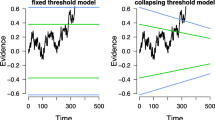Abstract
Typical experimental studies of learning aids will control in various ways for the time spent on the learning task. This paper reviews such methods and compares the possible confounding influences of indirect time effects in experiments with broad or restrictive time limits. Indirect time effects refer to changes in time spent on a text that are caused by learning aids. They are to be discerned from direct time effects that refer to the time the reading of the learning aids take. In particular, we give an overview of the adequacy of various time limits for answering different research questions. It is argued that experiments without time limits are potentially more likely to bring out performance effects. In the final part of this paper we give some illustrations of the different effects and methods, based on a series of six experiments into the influence of concrete analogies on learning. Those experiments show that indirect time effects are important and that performance results depend on the way one controls reading time.
Similar content being viewed by others
References
Ausubel, D. P. (1968). Educational Psychology: A Cognitive View. New York: Holt, Rinehart & Winston.
Carver, R. P. (1972). “A critical review of mathemagenic behaviours and the effect of questions upon the retention of prose materials,” Journal of Reading Behaviour 4: 93–119.
Faw, H. W. and Waller, T. G. (1976). “Mathemagenic behaviours and efficiency in learning from prose,” Review of Educational Research 46: 691–720.
Jaspers, J. P. (1977). “Learning of an instruction text without organizers, with advance organizers and with post-organizers” (in Dutch). Unpublished report, University of Amsterdam.
Malone, T. W., Macken, E. and Suppes, P. (1979). “Toward optional allocation of instructional resources: dividing computer-assisted instruction time among students,” Instructional Science 8 (2): 107–120.
Mayer, R. E. (1976). “Some conditions of meaningful learning of computer programming: Advance organizers and subject control of frame sequencing,” Journal of Educational Psychology 68: 143–150.
Mayer, R. E. (1979a). “Can advance organizers influence meaningful learning?” Review of Educational Research 49: 371–383.
Mayer, R. E. (1979b). “Twenty years of research on advance organizers: assimilation theory is still the best predictor of results,” Instructional Science 8 (2): 133–167.
Peeck, J. (1970). “Effects of prequestions on delayed retention of prose material,” Journal of Educational Psychology 61: 241–246.
Peeck, J. (1977). “Preinstructional strategies and extra reading time in learning from text,” Tijdschrift voor Onderwijsresearch 2: 202–207.
Rickards, J. P. and August, G. J. (1975). “Generative underlining strategies in prose recall,” Journal of Educational Psychology 67: 860–865.
Rickards, J. P. and Dener, P. R. (1979). “Depressive effects of underlining and adjunct questions on children's recall of text,” Instructional Science 8 (1): 81–90.
Rothkopf, E. Z. (1974). “Barbarism and mathemagenic activities: Comments on criticism by Carver,” Journal of Reading Behaviour 6: 3–8.
Simons, P. R. J. (1980). “By way of comparison: research into the influence of metaphors on learning” (in Dutch). Doctoral Dissertation, Tilburg University.
Simons, P. R. J. (1982). “Concrete analogies as aids in learning from text,” in: A.Flammer and W.Kintsch (eds.), Discourse Processing. Amsterdam: North-Holland Publishing Company, (in press.).
Underwood, B. J. (1964). “Degree of learning and the measurement of forgetting,” Journal of Verbal Learning and Verbal Behaviour 3: 112–129.
Wolters, L. A. M. M. (1975). “Questions about questions” (in Dutch), Unpublished Report, University of Nijmegen.
Author information
Authors and Affiliations
Rights and permissions
About this article
Cite this article
Simons, P.R.J. How we should control time on task—or should we?. Instr Sci 11, 357–372 (1983). https://doi.org/10.1007/BF00137294
Issue Date:
DOI: https://doi.org/10.1007/BF00137294




